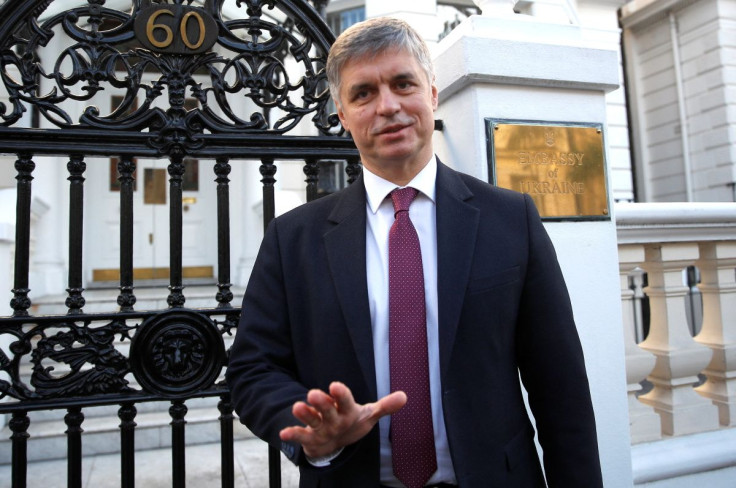Russia Says It Will Keep Talking For Now As Ukraine Hints At Concessions

Russia suggested on Monday that it was ready to keep talking to the West to try to defuse a security crisis in which it has massed a huge force within striking distance of Ukraine, while a Ukrainian official said Kyiv was prepared to make concessions.
In a televised exchange, President Vladimir Putin was shown asking his foreign minister, Sergei Lavrov, whether there was a chance of an agreement to address Russia's security concerns, or whether it was just being dragged into tortuous negotiations.
Lavrov replied: "We have already warned more than once that we will not allow endless negotiations on questions that demand a solution today."
But he added: "It seems to me that our possibilities are far from exhausted...At this stage, I would suggest continuing and building them up."
Washington has said Russia could invade Ukraine "any day now", and British Prime Minister Boris Johnson on Monday called the situation "very, very dangerous".
Russia has positioned more than 100,000 troops near to Ukraine's borders but denies planning to invade, accusing the West, which has sent a flurry of officials to Moscow and Kyiv, of hysteria.
Western countries have already promised sanctions on an unprecedented scale if Russia does invade, and the Group of Seven large Western economies (G7) joined the chorus by warning of "economic and financial sanctions which will have massive and immediate consequences on the Russian economy".
Ukraine's ambassador to Britain backtracked on remarks suggesting that Kyiv would reconsider its attempt to join NATO - one of Russia's primary concerns - but did say that other concessions could be on offer.
STOCKS SLIDE
"We are not a member of NATO right now and to avoid war we are ready for many concessions, and that is what we are doing in conversations with the Russians," he told the BBC in a clarification.
"It has nothing to do with NATO, which (membership application) is enshrined in the constitution."
The Kremlin said that Ukraine renouncing its aspiration to join the Western military alliance would significantly help address Russia's concerns.
Moscow has made clear it sees the former Soviet republic's quest for closer ties with the West, notably through NATO, as a direct threat.
Eight years ago, mass protests on Kyiv's Maidan square in favour of closer integration with the West forced out pro-Russian president Viktor Yanukovych.
Faced with the ascendancy of pro-Western politicians promising to advance democracy and fight corruption just across its border, Russia captured and then annexed Ukraine's Crimean peninsula, home to the Russian Black Sea fleet.
It also supported pro-Russian rebels who have seized part of Ukraine's industrial, largely Russian-speaking east in a war that is still adding to its toll of more than 14,000 lives lost.
Monday's talk of diplomatic efforts continuing brought the price of crude oil down off the seven-year highs it had hit earlier amid concerns that sanctions would disrupt exports from Russia, a major producer, in an already tight market. [O/R]
Major European stock markets slumped by between 2% and 3%, but on Wall Street the S&P 500 index was down only 0.5% at 1545 GMT. [.N] [MKTS/GLOB] [EMRG/FRX] [RU/RUB]
Sanctions could ultimately rebound on Western powers, which rely heavily on Russia for energy supplies, notably gas, as well as other raw materials.
ECONOMIC DAMAGE
Ukraine is already suffering economic damage from the standoff.
A surge in the price of 5-year credit default swaps on Ukrainian sovereign bonds suggested that markets gave Kyiv a 42% probability of defaulting.
Ukraine International Airlines, Ukraine's biggest airline, said its insurers had terminated cover for at least some of its aircraft on flights in Ukrainian airspace.
Lavrov told Putin the United States had put forward concrete proposals on reducing military risks, but that responses from NATO and the European Union - which has been at pains not to let Moscow divide its members - had not been satisfactory.
An EU official, who asked not to be named but has spoken to Putin by phone in the past, said the EU was looking at alternative sources of energy in case Russia cut off supplies.
"Russia is trying to demonstrate that it is the policeman in the region," the source said. "The criticism by Moscow against Ukraine is this idea that the people made a choice for liberal democracy, values, principles and freedoms."
German Chancellor Olaf Scholz held talks in Kyiv with President Volodymyr Zelenskiy, to be followed on Tuesday by a meeting with Putin in Moscow.
He said he saw "no reasonable justification" for Russia's military activity on Ukraine's border, and that "we are ready for a serious dialogue with Russia on European security issues". He announced a credit of 150 million euros ($170 million) for Ukraine.
While Zelenskiy affirmed that Ukraine would not give up its push to join NATO, Scholz said it was strange that Russia had raised the issue just now, when it was "not on the agenda".
($1 = 0.8838 euros)
© Copyright Thomson Reuters 2024. All rights reserved.





















